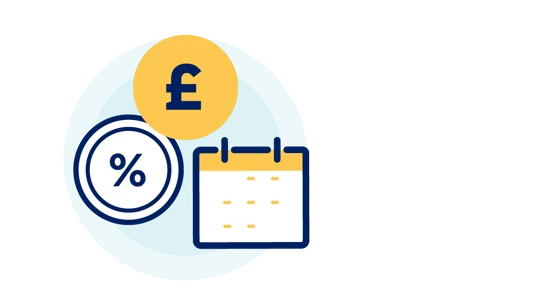 Written by: Danny Belton - Head of Lending
Written by: Danny Belton - Head of Lending
A fixed rate mortgage is a type of mortgage where the interest rate you pay is locked in for a set period of time. This is typically 2, 3, or 5 years, but can even be 10 years or more. This article focuses on 5 year fixed rate mortgages, which is a popular choice for homeowners in the UK. According to the Financial Conduct Authority, 74% of all mortgages are fixed rates1, typically between 2 and 5 years.
In this article:
- What is a 5 year fixed mortgage rate?
- Should I fix my mortgage for 5 years?
- What are interest rates like on a 5 year fixed rate mortgage?
- What are the advantages of a 5 year fixed rate mortgage?
- What are the disadvantages of a 5 year fixed rate mortgage?
- How do I find a 5 year fixed rate mortgage?
- What deposit do I need for a 5 year fixed rate mortgage?
- What to do when your 5 year fixed rate mortgage ends
- What will 2024 5 year fixed rates look like?
- Talk to a mortgage adviser for expert advice
- Frequently asked questions
- Related articles
What is a 5 year fixed mortgage rate?
With a 5 year fixed rate mortgage, your interest rate is guaranteed for the first 5 years of your mortgage term. This means your monthly repayments will remain the same throughout this whole period, no matter if interest rates in the wider market rise or fall.
Alternatives to 5 year fixes may include:
- 2 year fixed rate - this mortgage requires less long-term commitment, more flexibility, but provides less security
- 10 year fixed rate - this mortgage provides more security, but means higher interest rates
- Tracker mortgage - this mortgage follows the base rate and will go up and down with market changes
- Offset mortgage - this mortgage’s interest is offset against the savings that become linked to your mortgage
Should I fix my mortgage for 5 years?
While everyone’s circumstances are unique, a 5 year fixed rate can be a good option if:
- You want stability and a predictable monthly payment
- You expect interest rates to rise in the next 5 years
- You plan to stay in your property for at least 5 years
If you do move within 5 years, your lender may be willing to allow a product transfer to your new property, as long as you stick with them. For the most part, however, you will have to pay an early repayment charge if you remortgage within your 5 year fix.
What are interest rates like on a 5 year fixed rate mortgage?
According to data from Rightmove2, 5 year fixed interest rates tend to be slightly lower than 2 year fixes, but there will be exceptions. The interest rates offered on 5 year fixes will likely be comparable to other deals, but any savings are worth considering.
It’s worth keeping in mind that as interest rates start to fall, this may not be the norm.
Ben Thompson, Deputy CEO at Mortgage Advice Bureau says, “If you’re not sure what the right course of action is for a remortgage, speak to an adviser. They can help you come up with a plan that suits your personal situation.”
What are the advantages of a 5 year fixed rate mortgage?
There are a few key advantages to a 5 year fixed rate, namely budget stability, protection from rising interest rates, and overall peace of mind:
5 year fixes come with the certainty that your monthly payments won’t change for 5 years, no matter what happens in the market. On top of that, fixing for 5 years may allow your property to appreciate in value, which can increase your home equity (the amount your property is worth compared to your mortgage value). This could make you eligible for lower rates when you remortgage or give you the freedom to take some equity out of your home for exercises such as home improvements.
What are the disadvantages of a 5 year fixed rate mortgage?
While 5 year fixed rate mortgages are appealing for a variety of reasons, there are some factors to consider. For example:
- Potentially higher interest rates: longer term fixed rates can sometimes be higher than their shorter counterparts
- Limited flexibility: you may need to pay early repayment charges (ERCs) if you want to remortgage before the fixed term ends
- Missing out on falling rates: if interest rates fall while you’re on a fixed rate, you won’t benefit from lower repayments

Mortgage rates
and repayment
Compare current mortgage deals and find out what your interest rate and monthly repayments could be.
How do I find a 5 year fixed rate mortgage?
Working with a mortgage adviser means you don’t need to find anything yourself. They will search the market for a deal that best suits your needs. They take the hard work out of finding a good deal, saving you the hassle of manually checking lenders and comparison sites yourself.
Our mortgage finder also takes the hard work out of the process, making it easier than ever to get an idea of what mortgage deals are available right now.
To use our calculator, simply select the type of property you're looking for, as well as the mortgage type, and input some key information such as property value, deposit, and income.
These will give us a good sense of what's going to suit you, but speaking to a mortgage adviser means you'll get a tailored solution that works for your personal circumstances.
What deposit do I need for a 5 year fixed rate mortgage?
As with most mortgages, you need at least a 5% deposit. The higher your deposit, the more likely it becomes that you’ll get access to better interest rates, though your credit score will factor into this.
What to do when your 5 year fixed rate mortgage ends
You need to remortgage before your mortgage ends. If you don’t remortgage, you will move onto your lender's standard variable rate (SVR), which tends to be significantly higher than your fixed rate. This means your monthly repayments will increase and you’ll end up paying more than you need to.
Stay on top of your mortgage by using tools like our Mortgage Monitor, which tracks your mortgage against the wider market. We’ll send you monthly home reports, let you know when it's time to start thinking about remortgaging, and even send you an email if a better mortgage deal comes along.
That means if interest rates do fall, and we’ve calculated that it's worth you switching (fees included), we’ll let you know.
What will 2024 5 year fixed rates look like?
Many lenders are offering interest rates of sub-4% for lower loan-to-value mortgages, and we’ll likely see mortgage rates continue to fall over the course of 2024. Experts also suggest that interest rates will continue to fall over the next five years, but it all depends on what happens in the market and the world at large.
If you’re not sure what the right course of action is for a remortgage, speak to an adviser. They can help you come up with a plan that suits your personal situation.
Ben Thompson, Deputy CEO at Mortgage Advice Bureau, says:
“Those coming to an end of a fixed rate who need to secure a new mortgage deal are generally better off locking into a suitable fixed rate at the time. Some who are not overly stretched with the mortgage they have may choose to make a bet on rates reducing. They may either sit on a lender’s standard variable rate (SVR) for a while, or even take a tracker mortgage with a low or no penalty for exiting early - for example, when rates have fallen to lower levels.
“However, this is a punt. Lender’s SVRs are very expensive and tracker mortgages are more expensive than fixed mortgage rates, meaning rates would need to fall a lot for trackers to become good value. Markets expect rates to fall, but it may be that the UK economic recovery is sufficiently well-progressed that we may not get many cuts in the months ahead. So, I would say it's always best to lock in to the most suitable deal when your current one ends, and only take a gamble if you're equipped to potentially lose that bet."
Talk to a mortgage adviser for expert advice
Buying a house or remortgaging is a big financial decision, but we’re here to help. Working with an adviser means you get tailored advice to suit your specific needs and goals. Our advisers can compare deals, offer the best mortgage options for you, and guide you through the whole process.
Not sure where to start? Let us know - we’re on hand to help. Need to remortgage but rates seem overwhelming? Give us a call.
We’ll answer any questions you may have and be your guide from A-Z.
Frequently asked questions
You could get a 2, 3, or even 10 year fixed rate mortgage, it all depends on your personal goals and situation. Is stability your primary concern or do you want more flexibility? Speak to an adviser if you’re not sure what’s going to best suit you.
You should have the option of paying off a fixed-rate mortgage early, but you may need to pay an early repayment charge. Your mortgage agreement will highlight the specific terms.
Paying your mortgage off early will reduce the overall loan cost, since you won’t be paying interest on the outstanding balance. If you have other debts, savings rates are better than interest, or you have other investments you can make (like pension), then it may not be right for you.
Check out the article below to learn more:
The higher your score, the better, but there isn’t a set number you need to get a fixed-rate mortgage. Each lender’s criteria will differ.
Learn more about credit scores here:
Your affordability determines how much you can borrow, and lenders factor in the interest rate on your mortgage application. Because this can change, they want to make sure you can afford an increase on your interest, so they won’t necessarily lend you more if your interest rate is fixed.
If you are already in a fixed rate deal, it won’t change. If you want to get a new one, you may see some changes in the market.
Important information
Your home may be repossessed if you do not keep up repayments on your mortgage.
There may be a fee for mortgage advice. The actual amount you pay will depend on your circumstances. The fee is up to 1% but a typical fee is 0.3% of the amount borrowed.
Related Articles
Getting a mortgage but don't know where to start?
Purchasing a home is a significant milestone in the lives of many individuals, and if you're looking at getting a mortgage but don't know where to begin, you're not alone.
480 views | 2 years ago
Ready, steady, mortgage! Getting mortgage ready with the MyMAB App
A new survey has revealed that many buyers don’t feel ready to get a mortgage. Here’s how we can help.
570 views | 2 years ago
Different types of mortgages explained
Is choosing the right mortgage making your head hurt?
700 views | 2 years ago
No posts currently available
References:




